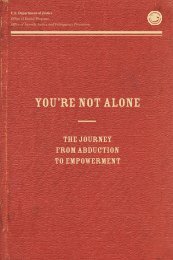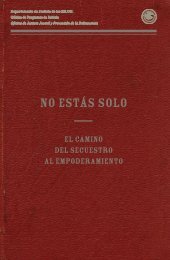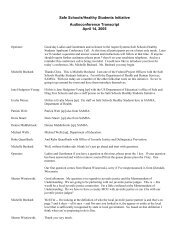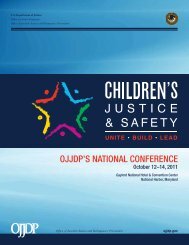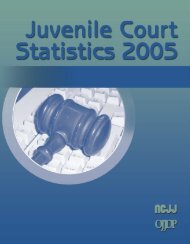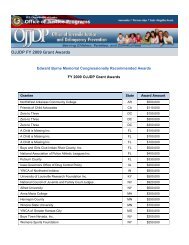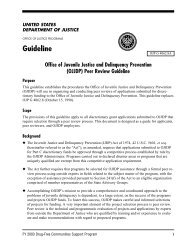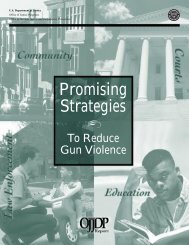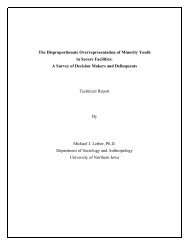OJJDP Family Listening Sessions: Executive Summary - Office of ...
OJJDP Family Listening Sessions: Executive Summary - Office of ...
OJJDP Family Listening Sessions: Executive Summary - Office of ...
You also want an ePaper? Increase the reach of your titles
YUMPU automatically turns print PDFs into web optimized ePapers that Google loves.
What was the most helpful What was the least helpful<br />
The foster mother said Pima County’s (Arizona) Make a Change program<br />
(www.pcjcc.pima.gov/2007_Annual_Blueprint.pdf) helped him with substance abuse treatment,<br />
but there were others a lot worse than him. She is trying to get him into treatment instead <strong>of</strong><br />
detention in the juvenile center. Many youth are locked up, and she feels their nation is not<br />
helping its people. She added that although her foster son is receiving some helpful services from<br />
the county, there really is not enough help for all <strong>of</strong> the youth at risk or in trouble.<br />
She said her foster son should be held accountable for his actions because, regardless <strong>of</strong> what<br />
services are <strong>of</strong>fered, it is his conscious choice to get into trouble. She also admitted that although<br />
it hurt her to see her foster son go into detention, it was also a relief because she at least knew<br />
where he was. Often, when he was truant from school or ran away from home, her first recourse<br />
was to call the police. But instead <strong>of</strong> helping, she said, the police told her, “You’re the parent.<br />
Why aren’t you looking for him”<br />
When the foster mother picked him up at detention to bring him to the listening session, she<br />
noticed positive changes in him that caused her to weep with joy. Perhaps that kind <strong>of</strong><br />
intervention should have happened sooner, she said. She told the circle that they shared an open<br />
and honest conversation while waiting at the airport, and it made her even more grateful to have<br />
had the opportunity to participate in the listening session.<br />
The youth stated that “sitting in the cell was actually helpful” because it gave him time to think<br />
and develop a deeper relationship with God. The least helpful is Intense Probation, he said.<br />
“They expect too much and it is very stressful. It isn’t right.”<br />
The foster mother spoke candidly about the discrimination issues that the youth faced in public<br />
school, which contributed to the truancy problem. She said he finally admitted that he was<br />
bullied at school. She stated that teachers blamed him for any problems or destructiveness that<br />
occurred at the school because he is American Indian, which is why he became truant. She said<br />
that the public schools and buses need to have onsite monitors to protect tribal youth from<br />
bullying. She said she expects her foster son to be accountable, but the system should also take<br />
into account that he has struggled and has been through a lot; for example, the youth witnessed<br />
her biological son kill himself and he saw her nephew get shot. “That is a lot for a boy to carry<br />
around on his shoulders,” she said.<br />
The youth also talked about how children ostracize tribal youth in the public school. It is<br />
particularly difficult for him because he has trouble staying focused or seated for long periods <strong>of</strong><br />
time. He said that now that he is finally in the alternative school, he is much happier.<br />
The foster mother discussed the importance <strong>of</strong> learning their culture and teaching it to their<br />
children. She stated that she had learned a great deal from her grandfather, who taught her that<br />
37



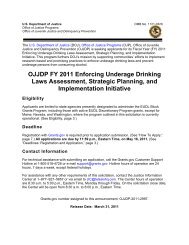
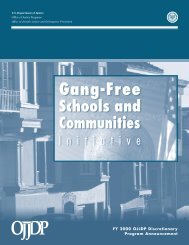
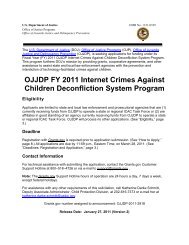
![Chapter 5 [PDF] - Office of Juvenile Justice and Delinquency ...](https://img.yumpu.com/46584340/1/190x245/chapter-5-pdf-office-of-juvenile-justice-and-delinquency-.jpg?quality=85)

